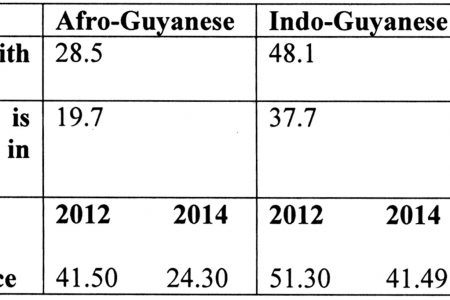New government should avoid the wrong fork in the road
Political relations in countries such as Guyana never cease to surprise.
Political relations in countries such as Guyana never cease to surprise.
This article will reach the editor at its usual time, which will be long before the results of the 2015 general and regional elections are even informally known.
Apart from some rudimentary commitments to rule better, from a political standpoint the PPP manifesto, Guyana Version 2.0, only promises more of the same and perhaps worse.

After former president Bharrat Jagdeo launched his extremist ethnic salvoes at Babu John, I had occasion to predict in this column that worse was yet to come.

Important elements of the wider strategy that finally brought down the PPP were: internal subversion to discredit the regime; various forms of economic pressure which, contrary to PPP propaganda, at best led to economic stagnation; more electoral manipulation, this time in the form of the imposition of proportional representation which favoured the opposition forces and the resuscitation of the long concluded Guyana/Venezuela border dispute as a backstop in the event that the PPP was still able to prevail.

I am not one of those who believe that for us to make progress as a nation our politicians could or should forget the past.

If the APNU/AFC coalition can seek succour in the failed Jagan/Burnham attempt to form a national movement, it would well be reminded that it also has much in common with the 1950s alliance between Forbes Burnham and Dr.

The APNU/AFC coalition seeks to draw some inspiration from the earlier attempt by Cheddi and Janet Jagan to establish a nationalist/socialist-orientated political organisation in the mid/late 1940s.

Even those of us who are not particularly religious have been socialised into putting great store upon the notion of individual responsibility, based essentially upon a belief in “good” and “evil”.

To increase the certainty of defeating the PPP/C, one has to shift the paradigm of elections and electioneering in Guyana.

It appears to me that the political parties that were involved in the APNU/AFC coalition formation proceeded as if the PPP is so broken and discarded that its responses would not matter or would be worth very little.

I have suggested before that for me, although getting rid of the PPP from government is a necessity at this stage, in our condition it is not a sufficient cause.

Last week I argued that to be successful, the opposition coalition must be bolstered by a creative strategy in which the first order of business must be the establishment of a comprehensive and properly focused programmatic platform.

Readers of this column will know that it has continuously advocated coalition between the opposition forces as a possible and necessary condition for the removal of the PPP from government, and the institutionalisation of a more adequate national governance arrangement.

After the opposition won the majority of seats in the National Assembly in the 2011 general elections, I was left bemused by the notion that had it taken the advice of those of my ilk and formed a pre-election arrangement with a single list, the PPP/C would have lost government.

Double jeopardy? Most of us adhere to some basic moral principles that we take for granted and which, if we are observed violating, can result in all manner of moral, legal, conceptual and practical difficulties and confusion.

When a seasoned and combative politician such as Minister Clement Rohee, who is always on the lookout for public kudos, took off at the speed he did in denying any involvement of himself and his ministry in the promotion of two of their employees, it is a sure sign that he suspects that all may not be well with the promotions and that he sees no advantage in being associated with the process.

“Governments, political parties and civil society are responsible for upholding and promoting democratic culture and practices and are accountable to the public in this regard.

An article “Sri Lanka one of the most corrupt nations in the world:” (http://www.lankastandard.

Western intellectual tradition is said to consist of the sometimes uneasy coexistence of two essential elements: one from Jerusalem and the other from the philosophical tradition of Athens.
The ePaper edition, on the Web & in stores for Android, iPhone & iPad.
Included free with your web subscription. Learn more.